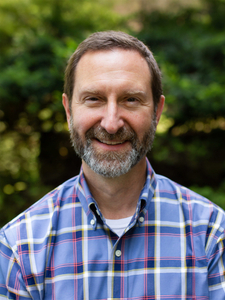Did you find this video helpful? Sign up now for our weekly email to receive new blogs, videos, podcasts, and other updates from CCEF.
Transcript
By definition, the struggle with obsessions and compulsions is a struggle with anxiety. Anxiety is the heart of this problem. And let me describe what the cycle in a sense looks like, a person who's struggling in this way. So a thought will come into your mind, unbidden; it's not like you're purposely thinking about it, but maybe a thought will come in. You're sitting in a room and there's a table next to you and suddenly the thought—you have this thought, I think that table was contaminated with a life-threatening kind of bacteria, out of nowhere. Well, that causes anxiety, right? Because the stakes are high, if there's a life-threatening, the potential of a life-threatening bacteria there. So the anxiety level rises, and what do I do in response to that? Well, that's the compulsive behavior. In this case, generally, it would be I need to take a moment and really clean that area so that I'm sure that there's no potential for contamination.
I could also avoid that area as well. That's another strategy in a sense, to deal with my anxiety. I just won't go near the situations or the places or the people that seem to be associated with this thought. Having done that behavior, my anxiety goes down and I have this sense of relief, but then the thought returns and the cycle gets stronger each time. It's sort of like when you get a mosquito bite and you're aware of the tingling sensation, and if you ignore it, it goes away. But if you scratch it, there's some relief just for a moment. But then the itch comes back with more of a vengeance, and then you scratch harder and then it, ah, relief for just a little bit, and then the itch comes back. That's the obsessive compulsive cycle, and anxiety is at the heart of that, and our anxiety is highest when the threat level seems to be the highest. Again, we don't have anxiety about things that don't feel threatening to us, but that cycle is about anxiety, high anxiety.
How does a person move out of that cycle? Well, I think of it in a twofold way. First and foremost, foundationally, I need to rest, trust, yield my anxieties to the Lord of the universe who is sovereign; he controls all things, he's all powerful. He's loving; he cares about me. He is wise; he knows what he's doing. And he's present with me. All of those things are critical for me to, in a sense, yield my anxiety or engage my anxiety. The second piece is actually acting on those realities that I just mentioned, and the best way to do that is actually face the particular fear in the Lord's help. And so I sit next to that table that has, that I'm concerned may have a life-threatening bacteria, and maybe I put my hand over there and touch the table, all the while calling out to the Lord for help and knowing that he is a wise and loving God. He's the keeper of my soul, as Psalm 121 says. And the longer I sit there, actually, in the midst of my anxiety, entrusting myself to the Lord, calling out to him, generally what happens is my anxiety starts to dissipate. It's interesting, even the secular research shows that the longer you sit with your anxiety, the less it becomes. How much more so when we're seeking to do that in relationship with the living God. If the goal is relief of anxiety, that's actually going to reinforce the cycle because that's what the obsessive-compulsive cycle is about; I got to get rid of this anxiety. Whereas the way out, paradoxically, is with the Lord's help, I sit in the place of my anxiety, knowing that he's there for me and helps me.


